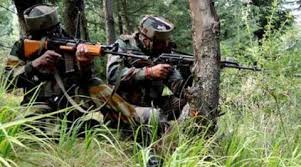Last Updated on September 20, 2020 12:10 am by INDIAN AWAAZ
Army is committed to ethical conduct during anti-militancy operations in Kashmir and has initiated an inquiry after social media reports indicated the three men had gone missing

AGENCIES / SRINAGAR
INDIAN Army has initiated disciplinary proceedings against its some soldiers involved in the killing of three men in Shopian in kashmir in alleged fake encounter in July this year.
Srinagar based Defence spokesman, Colonel Rajesh Kalia, said that troops have violated their powers during the operation in which three labourers were killed.
He said Army has initiated disciplinary proceedings under the Army Act against its men found guilty.
Defence spokesman said evidence showed soldiers had exceeded their powers under the Armed Forces Special Powers Act (AFSPA), which grants the army broad authority including shoot-to-kill powers.
In July the army said it had killed the three men in an operation against militants in the Shopian district.
The families of the slain men said security forces had killed them in cold blood. The army said it was still investigating the dead men’s ties to militant groups.
“The inquiry has brought out certain prima facie evidence indicating that during the operation, powers vested under the AFSPA 1990 were exceeded,” Rajesh Kalia, a Srinagar-based defence spokesman, said.
“Consequently, the competent disciplinary authority has been directed to initiate disciplinary proceedings under the Army Act against those found prima-facie answerable,” the spokesman said.
The spokesman said that Army is committed to ethical conduct during anti-militancy operations in Kashmir and has initiated an inquiry after social media reports indicated the three men had gone missing. He said that the inquiry was completed in four weeks.
“The evidence collected by the inquiry has prima-facie indicated that the three unidentified terrorists killed in Operation Amshipora– Imtiyaz Ahmed, Abrar Ahmed and Mohd Ibrar, who hailed from Rajouri. Their DNA reports are awaited. Their involvement with terrorism or related activities is under investigation by the police,” the spokesman added.
On July 18, the Army had claimed it killed three unidentified militants of the Al-Badr outfit in Amshipora village. That day’s police statement claimed, “during search, terrorists fired upon Army personnel and the encounter started. Later on, police and the Central Reserve Police Force (CRPF) also joined. During the encounter, three unidentified terrorists were killed.”
Some days after the Army’s claim a picture of bodies of the killed persons went viral on social media and the families of the youth identified them as their kin. They were identified as Muhammad Abrar (28), Ibrar Ahmad (18 ) and Imtiyaz Ahmad (21). The three were cousins and had visited Kashmir for a day’s work as labourers. The family had described the encounter as a staged one and sought investigation.
Under the Armed Forces (Special Powers) Act (AFSPA), security forces enjoy widespread impunity. Section 7 of the AFSPA provides virtual immunity for human rights violations by security force personnel, as any civilian prosecution can only proceed after obtaining prior sanction from the central government. In the 30 years that the law has been in force in Jammu and Kashmir, not once has sanction been granted by the central government.
The AFSPA was implemented in Jammu and Kashmir on September 10, 1990, after a notification was issued by the State government declaring Kashmir Valley as the disturbed area under Section 3 of law. Later, on August 10, 2001, the State government extended the disturbed area provision to the Jammu province.
Kashmir based human rights activist, Khuram Parvez says, some are deliberately trying to twist the Army’s statement in this case by claiming that the Army has indicted its personnel in the fake encounter. “But the fact is that the Army has not said so. The Army has only vaguely claimed that “during the operation, powers vested under AFSPA 1990 were exceeded” and therefore disciplinary proceedings have been initiated,” he said.
